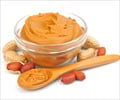A new research has revealed that an enriched peanut-butter mixture given at home is an effective method for the recovery of thousands of starving or malnutrition children.
The mixture contains peanuts, powdered milk, oil, sugar, and added vitamins and minerals. It is produced in a factory in the African nation Malawi and is given to the mothers to feed kids at home.According to a group of researchers at Washington University School of Medicine in St. Louis, the nutrient-rich mixture is the best method to restore children to health.
The research is extremely important because a study revealed that malnutrition affects 70 percent of all Malawian children with an estimated 13 percent of children dying from it before the age of five.
Mark J. Manary, M.D., professor of pediatrics and an emergency pediatrician at St. Louis Children's Hospital, has spent several years researching the use of the enriched peanut-butter mixture, called Ready-to-Use Therapeutic Food (RUTF) with small groups of severely and moderately malnourished young children in the sub-Saharan African country.
Results of the study appeared in the July issue of Maternal and Child Nutrition.
The research team, including Manary, students from Washington University in St. Louis and Baylor College of Medicine and researchers from Malawi, rolled out the treatment at 12 rural health centres in southern Malawi.
Advertisement
The aides then followed up with the children every other week for up to eight weeks. Of the 2,131 severely malnourished children treated with the RUTF at home, 89 percent recovered. Of the 806 moderately malnourished children treated with the RUTF, 85 percent recovered.
Advertisement
Traditional treatment of moderate malnutrition in Malawi involves feeding children a corn-based porridge at home, or for severe malnutrition, children are fed a milk-based porridge in hospitals. However, a severely malnourished child would have to eat about 25 spoonfuls of porridge to equal the calorie density in one spoonful of the concentrated RUTF, Manary said. The recovery rate for children given the standard therapy is less than 50 percent.
The result showed that village health aides can reliably identify which children need treatment, manage the program and follow up with children after the program, which eliminates the need for onsite medically trained professionals to supervise it.
"What's really exciting to me is that we've demonstrated that we can put this research into practice on a large scale, it can benefit tens of thousands of kids, and there are not going to be operational barriers in some very remote settings like sub-Saharan Africa.
Mothers in Malawi know that malnutrition is the single biggest threat to their children's existence. They want nothing more in this life to have their children survive and grow up. When their child comes through treatment successfully, they will pay extra attention to make sure it doesn't happen again," Manary said.
Source-ANI
LIN/J










